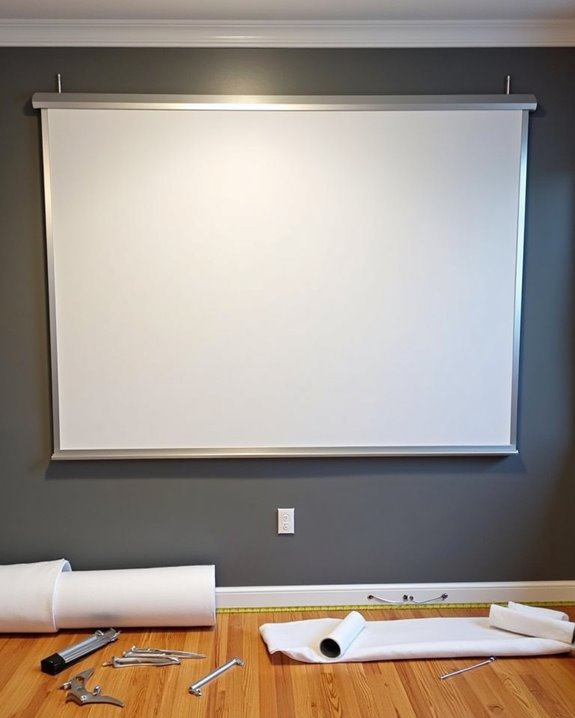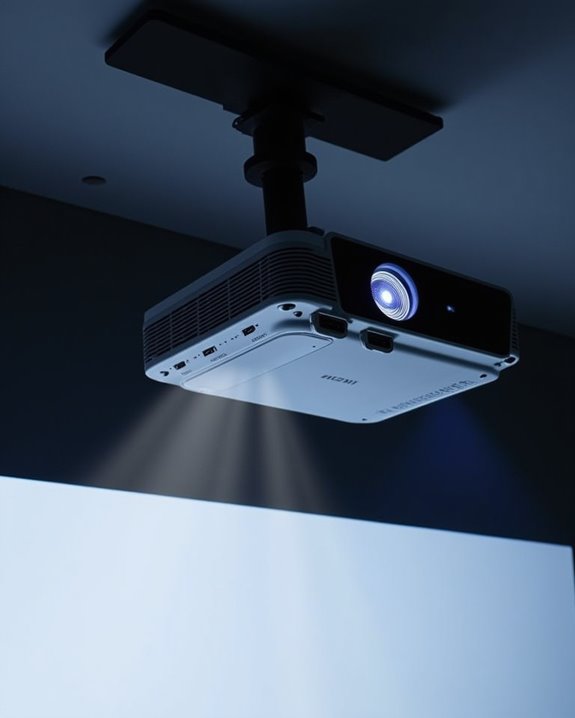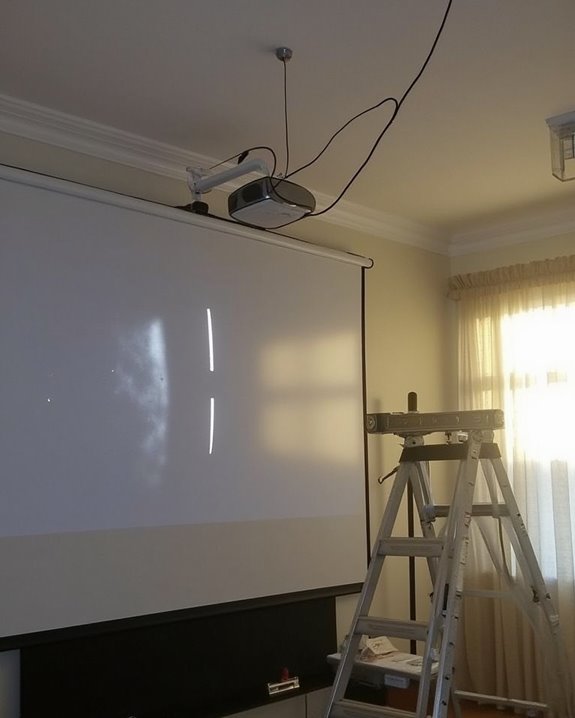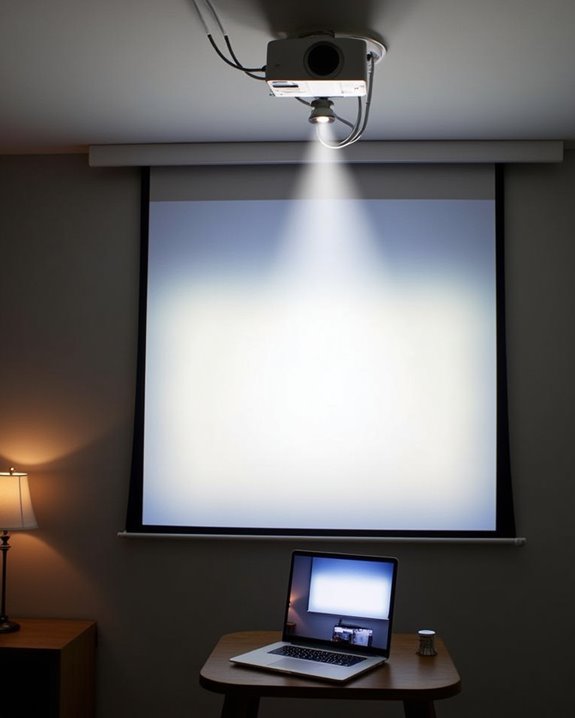When it comes to choosing a projector for your home theater, the array of options can seem almost endless, but you’ll quickly notice that a few companies consistently stand out for their advanced technology, image quality, and innovative features. Brands like Sony, JVC, Epson, BenQ, and Hisense each bring unique strengths, offering native 4K resolution, high brightness, laser light sources, or integrated smart features, so understanding what sets these manufacturers apart is essential before you make your final decision.
Key Takeaways
- Sony leads in true native 4K projectors with top-tier image quality, advanced calibration, and long-lasting laser light sources.
- JVC is renowned for premium 4K and 8K-equivalent projectors with superior contrast, sharpness, and advanced HDR support.
- Epson offers excellent value, reliable performance, and vibrant color accuracy using 3LCD technology for a wide range of home theater setups.
- BenQ provides affordable 4K projectors with strong color reproduction, cinematic image quality, and user-friendly features.
- Hisense specializes in smart, ultra-short-throw laser projectors with built-in streaming, voice control, and large-screen capabilities.
Sony: Elevating Home Theater With 4K Excellence
How does Sony consistently set the standard for home theater projection? You’ll notice their projectors deliver true native 4K resolution, thanks to advanced SXRD panels, offering over 8 million pixels for exceptional clarity and color accuracy. With projection calibration features, you can fine-tune image performance to match your room and screen, ensuring accurate HDR and color reproduction. Sony’s models, like the VPL-XW5000ES, achieve up to 2,000 lumens, maintaining vivid images even on screens up to 200 inches. For sound integration, Sony designs their projectors to seamlessly connect with high-end audio systems, supporting HDMI and HDCP 2.2 compatibility for 4K streaming. Their long-lasting laser light sources and support for Motionflow technology further enhance picture realism and motion clarity, delivering an all-encompassing home theater experience. Additionally, Sony offers each projector in Black and White, allowing users to select a finish that best complements their home theater décor. When considering display options, it’s useful to compare Sony projectors to advanced TVs that feature quantum dot technology for outstanding color accuracy and brightness.
JVC: Leading Native 4K and 8K Projector Innovation

When you’re searching for cutting-edge home theater projection, JVC stands out by introducing both native 4K and 8K-equivalent projectors that deliver remarkable image clarity and brightness. JVC’s DLA-NZ900 and NZ800 models feature true 8K resolution, utilizing advanced e-shift and LSI technology for sharp, fluid visuals, even with fast-moving content. These projectors support high dynamic range formats like HDR10+ and HLG, ensuring vivid color and deep contrast, while a laser light source provides up to 20,000 hours of consistent performance. For flexible installation, JVC incorporates lens versatility with a broad throw ratio range and both horizontal and vertical lens shift, allowing precise projection calibration and alignment. Multiple HDMI inputs and network connectivity simplify integration, supporting a truly immersive home theater experience at any screen size. JVC also integrates advanced auto-focus and setup features found in premium projectors to enhance ease of use. Notably, JVC projectors achieve a dynamic contrast ratio of up to 1,000,000:1, which significantly enhances black levels and detail in dark scenes for an even more cinematic viewing experience.
Epson: Balancing Value and Performance in Home Cinema

Epson has built a strong reputation in home cinema by offering projectors that strike an impressive balance between performance and value, making them a practical choice whether you’re setting up a dedicated theater room or upgrading your living space for entertainment. Their models frequently feature 4K resolution with 3LCD 3-chip technology, ensuring accurate color calibration and vivid, clear images. Lens versatility is a highlight, as some models provide precision glass lenses and replaceable options, accommodating various room sizes and layouts. You’ll find advanced processors like the QZX enhancing HDR and dynamic tone mapping, while refresh rates up to 120 Hz and ALLM support serve both movies and gaming. Additionally, Epson’s 15-element glass lens design delivers edge-to-edge focus uniformity and exceptional image clarity, minimizing light leakage and maximizing performance. Many Epson projectors also feature brightness levels ranging from 3,000 to 4,000 lumens, ensuring vibrant images even in rooms with ambient light. Imagine these features in your home:
- Brilliant HDR color and contrast
- Flexible lens options for any space
- Low-latency gaming experiences
- Simple, web-based calibration
BenQ: Affordable Quality for Home Theater Enthusiasts

For home theater enthusiasts who want advanced features without breaking the bank, BenQ stands out as a brand that consistently delivers affordable quality. You’ll find models like the W2720i and HT3550 offering true 4K UHD resolution, CinematicColor™ technology for vibrant, accurate colors, and support for wide color gamuts like DCI-P3 and Rec.709. BenQ projectors are known for reliable screen calibration, ensuring your images appear sharp and lifelike right out of the box, while auto vertical keystone makes setup simple. Many BenQ options, such as the compact MH733, include portability features that let you move your projector easily between rooms. With high brightness, extended lamp life, and immersive 3D support, BenQ offers advanced performance at a competitive price. BenQ’s shopping cart and account management tools make it easy to track your purchase, manage your account, and access support resources directly through their official website.
Hisense: Integrating Smart Features and All-in-One Convenience

Although home theater projectors often focus on image quality alone, Hisense distinguishes itself by combining advanced visual technology with integrated smart features and all-in-one convenience. With Smart Integration at the forefront, Hisense projectors utilize the VIDAA OS for streamlined access to streaming platforms, voice commands, and smart speaker connectivity, ensuring you can control your entertainment with ease. Their Portable Design, including compact mini projectors and gimbal mounting for flexible placement, allows you to set up anywhere without complicated installation. Hisense also enhances the viewing experience with intelligent object detection and eye protection systems, automatically adjusting the display for *superior* comfort and visibility. Built for high performance, versatility, and ease of use, Hisense projectors are suitable for everything from movies and gaming to outdoor gatherings and presentations. Imagine your home theater setup with:
- Vibrant 4K laser visuals and IMAX Enhanced support
- Wireless streaming and intuitive controls
- Built-in JBL audio and Dolby Atmos
- Flexible screen sizing, from 65 to 300 inches
Key Features to Look for in a Home Theater Projector

When selecting a home theater projector, you’ll want to focus on several key features that directly affect picture quality, connectivity, and overall usability. Resolution is critical—look for Full HD, 4K, or higher for sharp images, and consider pixel shifting for enhanced clarity. Equally important is brightness, measured in ANSI lumens, which ensures vibrant images in various lighting conditions. Contrast ratio, such as 5892:1, delivers deeper blacks and brighter whites. Motion handling technologies like MEMC reduce blur in fast scenes. For superior color, choose models with strong color saturation. Evaluate connectivity options, including multiple HDMI ports, Wi-Fi, and Bluetooth. Don’t overlook sound—built-in speakers and ARC compatibility can streamline your setup. Proper projection calibration and high-quality screen material further maximize image performance. When comparing models, note that out-of-the-box color accuracy is emphasized in top home theater projectors, as it minimizes the need for manual calibration and delivers excellent image quality right away.
Understanding Projector Display Technologies

Choosing the right projector for your home theater also means understanding the core display technologies that power these devices, since each type impacts image quality, color accuracy, and overall viewing experience. DLP, LCD, and LCoS are the primary technologies you’ll encounter. DLP projectors use a micromirror chip and color wheel, offering sharp images, high contrast ratios, and compact designs, with projection resolution boosted by pixel-shifting. LCD systems employ separate panels for each color, providing vibrant color accuracy and balanced brightness, with strong performance in both white and color rendering. LCoS combines reflective and transmissive techniques, delivering smooth, high-resolution images and excellent contrast, often preferred in premium models. Each technology has unique strengths and weaknesses suited for different applications, making it essential to match your projector choice to your specific needs and viewing environment.
- DLP: sharp images, portable, strong contrast
- LCD: vibrant color, balanced brightness
- LCoS: smooth images, high resolution
- Light sources: lamps, LEDs, lasers—impacting brightness and color
Market Trends in Home Theater Projection

As home theater projection continues to evolve, the market is seeing strong growth driven by both advancements in technology and changing consumer expectations for immersive entertainment. You’ll notice an increasing shift toward high-definition content, with 4K and even 8K projectors becoming more accessible due to pixel-shifting and enhanced chipsets. Ultra-short-throw and laser projectors are popular for their space-saving designs, brightness, and color accuracy, while smart projectors integrate streaming and voice control, making your setup more convenient. Budget options are expanding, offering portable projectors with HDR capabilities and competitive pricing, especially from brands like BenQ and Epson. Geographic trends highlight North America and Asia Pacific as leaders, but emerging markets in South America and Africa are rapidly growing as disposable incomes rise and consumer awareness spreads. The market is moderately concentrated, with major players like BenQ, Epson, JVC, Optoma, and Sony collectively holding a significant share of the global projector industry.
Setting Up the Ultimate Home Theater Projector System

With the rapid advancements in projector technology and the growing demand for immersive home entertainment, setting up the ultimate home theater projector system requires a methodical approach that considers every component of your space. First, select a projector that matches your room size and ambient light, ensuring the throw ratio fits your intended screen size. Accurately measure the projection distance, using ceiling mounts anchored to solid joists for stability. Next, choose a screen with material and gain suited to your lighting conditions, installing it at eye level for best viewing comfort. Proper projector concealment can enhance room aesthetics and reduce visual clutter, especially when integrating the device into ceiling designs or furniture. Integrate a sound system tailored to your room acoustics, optimizing speaker placement and calibration for balanced audio. Finally, arrange seating for unobstructed views and manage cables and lighting for a professional finish.
- Projector mounted securely overhead
- Screen size optimized for viewing distance
- Surround speakers positioned for room acoustics
- Seating arranged for clear sightlines
Frequently Asked Questions
How Do Projectors Compare to Large TVS for Home Theater Use?
Choosing between projectors and large TVs is like picking between a movie theater and a billboard at home. Projectors offer large screens and flexible setup, though you’ll trade some projection resolution and face greater setup complexity than TVs.
What Maintenance Is Required for Home Theater Projectors?
You’ll need to stay on top of cleaning filters and regular bulb replacement. Don’t forget to clean the lens, check cables, and update software. Proper maintenance guarantees your projector delivers sharp images and lasts longer.
Can Projectors Be Used Outdoors for Movie Nights?
Imagine your backyard glowing with movie magic—yes, you can use projectors outdoors! Just focus on an outdoor setup with high brightness, portable screens, and always plan for weather considerations to protect your gear from rain or dew.
How Long Do Projector Bulbs or Lasers Typically Last?
You’ll find bulb lifespan usually ranges from 2,000 to 5,000 hours, but eco-mode can push that higher. If you opt for lasers, you’ll benefit from greater laser durability, often lasting 10,000 to 20,000 hours.
Are Projectors Safe for Children’S Eyes in Home Settings?
Just like sunlight filtered through leaves, projectors are generally safe for children’s vision when you’re mindful of eye safety—keep screen time moderate, control brightness, maintain distance, and make certain the room’s well-lit to protect young eyes.





